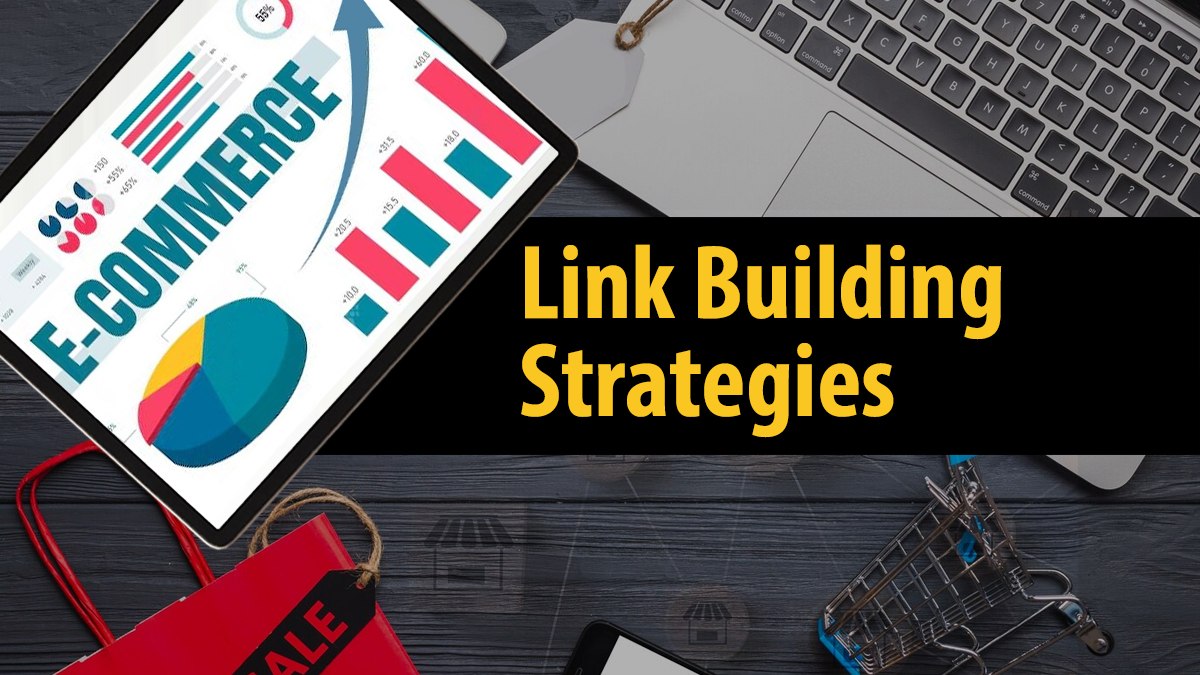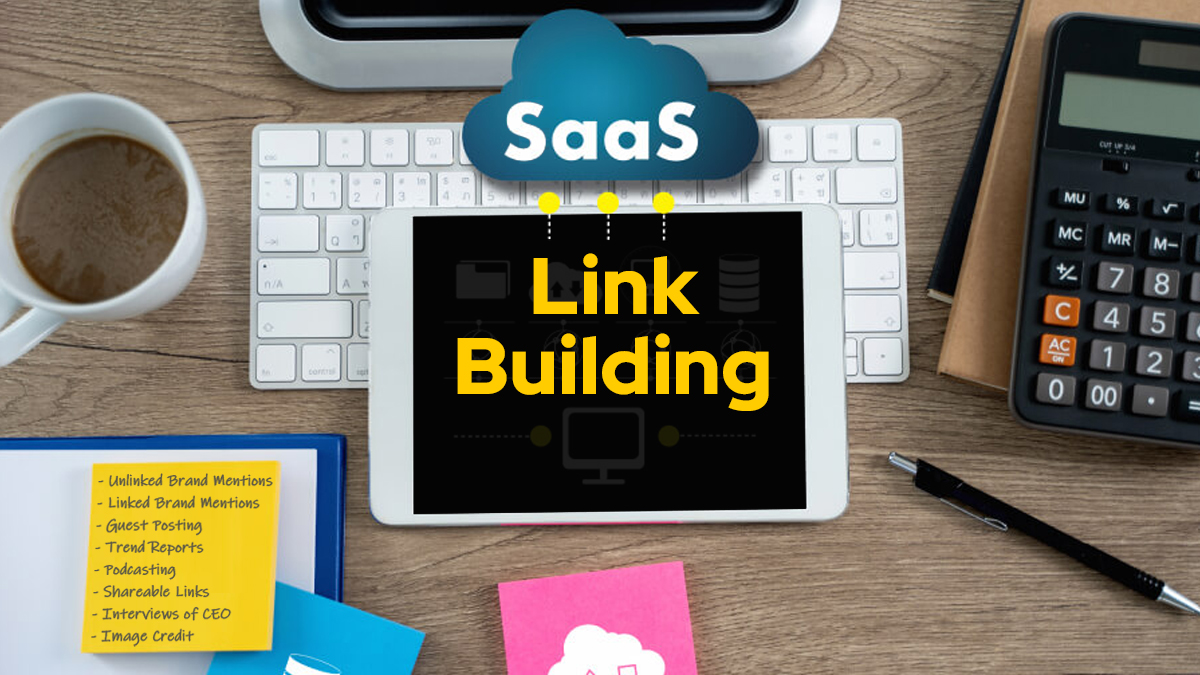Having a good ecommerce store is important for sales. But, how do you bring people to your website to begin with? One of the best ways to attract more customers to your website is by establishing trust in your brand online.
Many things influence how much people trust a brand, and one of those things is building links. High quality link-building is a key part of successful SEO for online stores. It helps improve search engine rankings and brings in the right customers.
This process is more than just getting links; it needs a smart plan that pays attention to how important and good the linking sites are. In this post, we’ll look at different ways of ecommerce link building that work well for online stores.
What are Ecommerce Backlinks?
These links are acquired from other websites and lead to your ecommerce store. For example, links from Wikipedia to your website. Now, there are also links within the same website. These internal links lead from one page to another page on the same website.
Even though these can be seen as backlinks, that’s not what most people mean when they talk about link building for online shopping. So, links from your main page to your blog articles cannot be considered as backlinks.
Also Read: How to do Link Building the Right Way?
What Can You Gain From Ecommerce Link Building?
Building links for your ecommerce site can help more people find your website and bring in more visitors. This can help you get more customers because the more people see your stuff, the more you can sell.
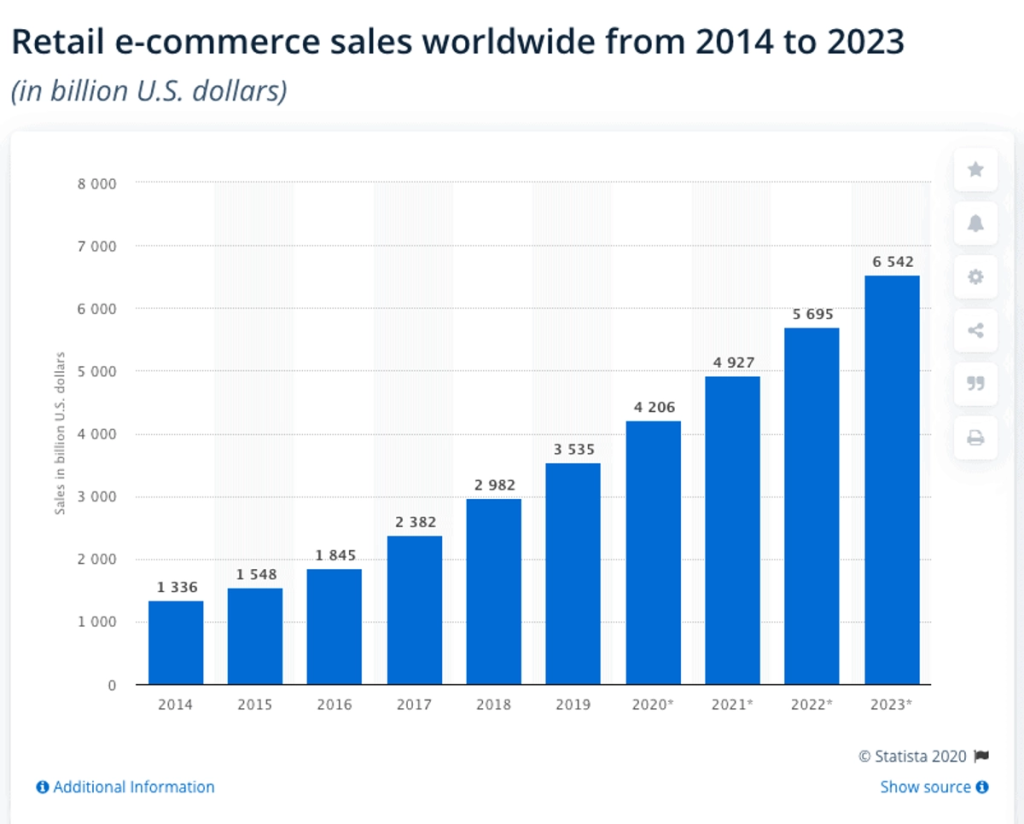
And that’s the main aim of ecommerce websites. But it’s not only us who think that ecommerce backlinks are very helpful. Studies show it, too. Here are some facts you might want to check out:
- The top search result usually has about 3.8 times more links from other websites than the results in positions 2 to 10. This doesn’t mean that backlinks are the only reason for the differences in these results. But they are probably some of the most important ones.
- Ahrefs’ research showed a clear connection between the number of websites that link to a page and how much traffic and keyword rankings that page gets. One of the points is that it’s really hard to rank for very popular keywords without getting backlinks. It’s easier to rank for keywords that are not very hard to compete for, but those keywords usually bring in a lot less traffic.
- 92% of SEO experts think that their competitors are paying for links. 53.9% of them said they spent more than $300 on one good link. This shows how important link building is for ecommerce businesses. They probably wouldn’t spend so much money on it if it didn’t help them.
Importance of Link Building for Ecommerce Sites
Improves Domain Authority
Building links is important for increasing your ecommerce store’s domain authority. When you get links from reliable and respected websites, it shows the bots of search engines that your site is trustworthy and important.
Every good link to your site shows that others trust it, which helps your site look better and become more reliable. Having a higher domain authority makes your pages show up better in search engine results, which means more people are likely to visit your site for free.
As your domain authority increases, your online store becomes more noticeable compared to your competitors, giving you an advantage. Having a high domain authority helps more people find your site and makes them trust it more, which makes your site more appealing to visitors.
Boosts Search Engine Rankings
Link building helps your online store show up higher in search results. Search engines check backlinks to see how important and trustworthy your content is. By getting good and related links from other websites, you can help your site rank better for important keywords.
This better ranking makes your website easier to find in search engine results, which brings more visitors without paying for ads. Better rankings mean more people can find your site, which might lead to more visitors and sales.
Keeping your link-building strategy up to date helps improve your website’s search engine rankings, which is important for your online business to stay visible.
Better Referral Traffic
Smart link building helps improve SEO and also brings more visitors to your ecommerce site. When trusted websites link to your content, their visitors are more likely to check out your site, which increases the number of people coming directly to you.
This type of referral traffic is usually very focused because the people who come through related links are already interested in similar products or services. Because of this, these visitors are more likely to interact with your website and become customers.
By getting links from popular and related websites, you increase your chances of attracting good leads and expanding your customer base.
Increased Brand Visibility
Creating a good link profile increases how easily people can find your ecommerce brand online. When trusted websites link to your content, more people who might be interested in your brand will see it.
This greater visibility helps more people recognize your brand and trust it, as more individuals learn about your online store. Building links regularly helps make your brand known and trusted in your industry, which can lead to more loyal customers and greater trust.
Placing links in smart ways can help more people see your brand and bring more visitors to your website, which can help your business grow over time.
Helps with Content Marketing
Link building boosts and enhances your content marketing plan. Good content naturally gets links from other websites, but actively working to build links helps your content reach more people.
By making useful content that people want to share and promoting it to specific audiences, you increase your chances of getting links from important websites. This teamwork makes your content easier to see and engage with, bringing more visitors to your online store.
Good link building helps your content marketing and makes your website a useful resource. This leads to steady growth and boosts your credibility in your field.
Also Read: Winning Ecommerce SEO Strategies for Your Online Store
17 Strategies to Effectively Build Links for Ecommerce Stores
Linkable Assets
To acquire links add a blog to your website with interesting content. Then, reach out to others and ask them to link to your articles. You can improve your chances of getting more good results by linking to pages that convert well.
The important thing is to discover what kind of content will likely get links. You can find a competitor in Ahrefs and look at the “Top Pages by Links” section to see which pages have many links pointing to them. Look at a few competing websites until you have a list of possible options.
Now that you have some ideas, make sure to create content that is better than other similar pages. This makes it more likely that people will share your resource instead of your competitors’.
Strategies to make your current content better include providing more details, adding pictures or videos, or including new research. The last step is to reach out to people and ask them to link to your page. Use Ahrefs to find websites that link to content like yours, and then email them about your resource.
Tools
Making specific tools for your niche is a good way to get backlinks for your online store and bring in the right visitors to your website. First, you need to know what problems your audience usually has with your products or area of interest.

Just create a tool for it and put it on your online store. For example, if you have a grocery store, your customers might have a hard time with:
- Figuring out the right products for adults and babies.
- Finding products as per their diet plan.
- Discovering their personal taste.
You can create tools like quizzes or calculators that help your audience fix these problems. This is how you can be different from other online stores and make sure your customers remember you when they want to make a purchase. By the way, your tool doesn’t need to be fancy; it just needs to be helpful.
Guides
Another way to get ecommerce backlinks through content is to create helpful guides. To find out what kinds of guides people would like, talk to your customers and the teams that help them, like:
- Sales teams
- Store employees
- Customer support
You can ask about the usual questions customers have, misunderstandings about your products, or common reasons why customers hesitate to buy. Change that information into original ideas for content.
Helpful guides can get links naturally. To make sure that happens, try sharing them on social media and other places, like your newsletter. You can also let other bloggers know about your guides.
Original Research
Doing original research will likely help you get good links to your ecommerce website.
The reason is clear, if you’re the only place someone can get information from, then you’re the only place they can connect to.
Also, doing your own research leads to new and unique ideas. That’s important because it can help you rank higher, boost your credibility, and do many other things.
Best Lists Award
To get good links for your ecommerce store, think about writing a blog post that shares the best websites in your area. This method gives useful information to your audience and helps you get links from other websites naturally.
Begin by looking for important websites, key people in your industry, and well-known blogs that relate to your area of work. Point out what makes them special, like expert opinions, trend insights, or useful resources.
By providing a clear and helpful list, you show that you know a lot about your field. This also makes the websites you feature more likely to link back to your blog, which helps make your site more respected and brings in more relevant visitors.
FAQ Pages
FAQ pages are helpful resources that offer answers to questions about issues in your field. They are a kind of asset that can be linked to, but they usually get links in a different manner.

With FAQs, the goal is to get your page to show up high in results pages for many specific keywords on one topic, instead of just reaching out to people. You can still do outreach if you want. Later, when people look for these topics, they will find your post.
These pages are easy to find and helpful, so people are likely to share them on social sites or use them in their blogs.
Niche Edits
Niche edits can work well for online shops. First, you look on Google for information related to your product. Then, you contact the owner of the site and ask them to link to your site in their content. The bad part is that you usually have to pay for these links.
But, the quickness of getting links this way can make it worth the investment. For example, a store that sells baby products could contact websites that have articles about pregnant women or about the best baby moisturizers.
You can get as many links as your budget allows and as many websites as you can find that are willing to sell you links. Be cautious when reaching out to publishers and blogs. Don’t buy links from shady websites that have a lot of paid links. Being connected to them could hurt your Google ranking.
Digital Public Relations
Digital PR is a good way to get links from important websites. But it can be difficult to do because you need to have a story that will get the media’s attention and also be able to connect with reporters and bloggers. Here are four simple ways online stores can get backlinks using digital public relations.
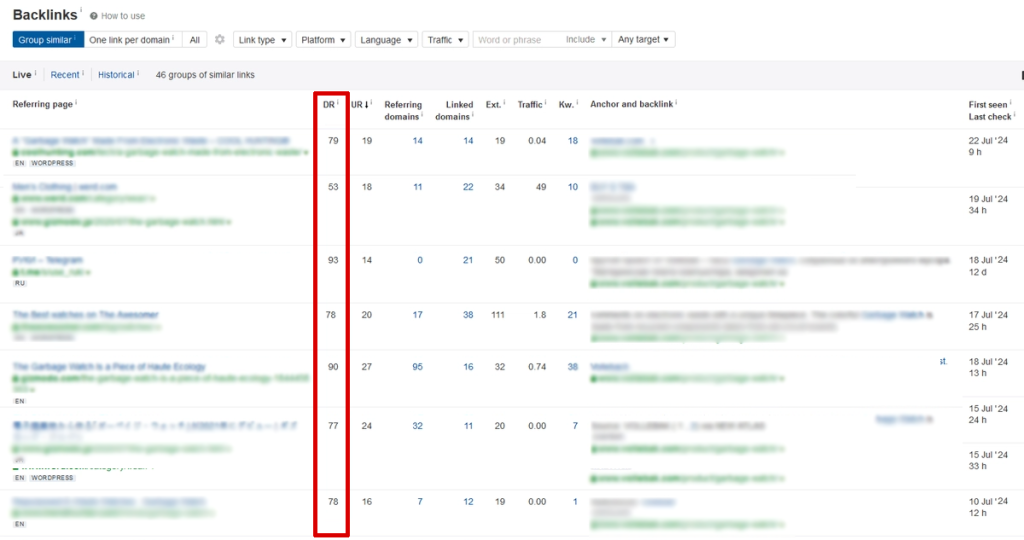
- Unique Products
Launching a visually appealing product is a great way to attract media coverage and get links to your website. - Charity
Sharing information about your charity or community work with the right magazines or websites might lead to getting links back to your site. - Roundups
Having your product included in website roundups is a great way to gain backlinks. Look for websites and blogs that are about your field. Then, reach out to those that have written roundups related to your product and ask if they can include you in their future articles.
You might need to pay for getting your product shown, or send your product to the right fashion bloggers. But it will be worth it because you’ll get more people seeing it, possible customers, and important links to your site. - HARO
It stands for “Help a Reporter Out,” which is a service that helps connect journalists with valid sources of news. Services like HARO and ResponseSource are great for new online stores. Journalists from big publications use these services to find ideas and insights from business owners.
You can choose requests that match your industry, so you only respond to those that are relevant to you. We suggest that you include this strategy in your routine and spend 45 minutes each day responding to important journalist requests. - Discounts
Discount codes can help you get links to your website. You just need to be ready to accept the offers. - Events
Lots of articles talk about events, so if you hold one, it might help you get some links to your website. Think about what events your customers would like to go to, or even organize charity events, like fundraisers.
Affiliate Partnerships
Building partnerships with affiliates is a great way to boost sales and attract more visitors to your website. It also helps to get more links that lead to your site. Pick the right partners, and you can get links from good websites.
Another advantage is that these links usually lead to your product pages. The difficult part of this plan will be creating an affiliate program and finding the right affiliates to join. You need to show potential partners that your program can earn a lot of money.
This could be through high payouts, a large number of sales, or a website that turns visitors into customers effectively. The good news is that if you can show your program makes money, it should be easy to find partners who want to connect to your site.
If you always provide good results for publishers, they will be motivated to keep writing about your brand. If you can do this, brands will write articles about their products, even for straightforward updates like a new product launch or a sale.
Affiliate links are usually labeled “Nofollow,” which means they probably won’t impact your rankings very much. They will help more people see your site and bring more visitors to it. This can lead to more natural links from other websites.
Product Reviews
Reviews are a great way to get links to your website. Reach out to websites related to your field and see if they want to review your product. What they want back will vary by the website.
A smaller blogger might be glad to get your product for free if they can write a review about it. This might be a good offer for you, based on how much your product costs. On the other hand, a bigger publisher might ask you to pay.
There are a few things you need to know. To follow Google’s rules, paid reviews and posts need to be labeled, and the link should have a “sponsored” tag. If you want “Dofollow” links, you can find websites that will review your product and add them.
But you need to be careful that the site doesn’t say you asked them to review the product. The review should come across as natural and not forced, which is completely acceptable.
Think about all the many websites that talk about the new iPhone after launch.
Apple doesn’t need to pay websites to review their products, and we are sure they hardly ever do. They don’t have to, because people will do it on their own without any help. Look at those kinds of reviews and try to copy their style for your brand.
Unlinked Brand Mentions
When people talk about your brand in a blog, they usually include a link to your website. Sometimes people forget to include the link. If you know when this happens, you can contact the owner and ask them to link to your site. Many times, they will be happy to help.
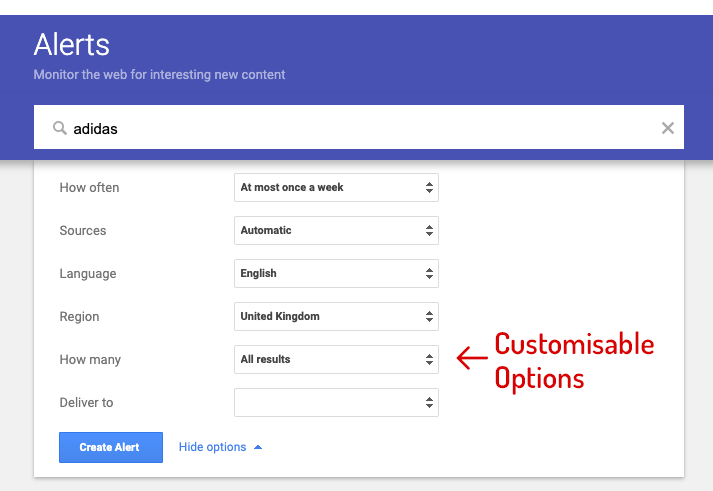
Creating an alert in Google for your business will notify you whenever someone writes about your brand online. You can change the alert settings by the type of source, language, region, and how often you want to get emails.
Finding mentions of your brand that don’t have links is a simple way to get backlinks, but this only works for brands that are already known and talked about.
SMEs
One of the main trends in content creation is featuring experts in different fields. Subject matter experts are people who know a lot about a particular topic. They usually have a lot of experience and education in that area.
Including them in your content can help you reach various marketing goals, like building trust and creating better connections with your audience. For example, if you sell baby products, your audience would like seeing experts like pediatricians.
Including SMEs in your content can help you get links for your ecommerce site. First, the SMEs you highlight will probably share and link to your content on their own. Secondly, you will probably receive links from other websites that talk about similar subjects and want to include your expert opinions or quotes.
You’ll succeed in many ways. Think about what kinds of subject matter experts would be important for your audience and your area of focus. Next, try to find them on social media, Google, or other websites. Talk to them and include what they say in your content.
Partnerships
If you enjoy situations where everyone benefits, you’ll really like this ecommerce link building method. It involves helping other businesses get noticed so they can help you get noticed too.
The best way to do this is to team up with brands that sell similar products to yours. Here are some suggestions to spark your creativity:
- If you sell makeup products, team up with a skincare brand.
- If you sell expensive suitcases, team up with an airline.
- If you sell jewelry, team up with a clothing brand.
Just make sure to tell other websites that you are promoting them or set up partnerships ahead of time. This way, you’ll be sure to receive a link back. You might be wondering, that all sounds good, but how do I find businesses to team up with? Here are three methods that you can use:
Contact current partners: If you work with other companies, you might already have good partners for link building in your connections. For example, you can see if one of your suppliers or customers would like to work together with you. You might find some chances you didn’t notice before.
Offline network: If you can’t find good contacts in your network, it’s time to grow it. One way to meet other business owners is by going to networking events. It doesn’t matter if the events are only in your area, as long as you meet business owners who have websites.
Offline network: You can also connect with others online on professional sites like LinkedIn. Make content and talk to people, and you’ll quickly make more connections.
Broken Links
Broken link building is a common way to improve search engine rankings. It can help any online business, but it’s especially good for ecommerce brands that have few chances to build links. This plan involves looking for broken links (404 errors) and swapping them with your own links.

You can use a tool called SEO Minion to quickly find broken links. When you find them, see if you already have links that can take their place. Think about the situation, does your page fit with the anchor text and the content around it?
If yes, just ask the website owners to change the broken link to a link to your page. Most people will be glad to help because they don’t want their readers to end up on error pages.
If you can’t find contact details on the website, try using Hunter, a tool that searches the internet for email addresses.
If you don’t have good content, you need to make it first. It’s important not to overwhelm potential partners with links that aren’t related, especially if you want to create lasting relationships. If you can’t make good content on your own, hire a writer or get a link building agency to help you.
Press Release
Another way to build links for your online store is to get a news article written about it. Sometimes, other news websites and blogs share press releases. Some news services make you pay to share a press release, while others do not.
We suggest having your press releases shown in Google News to get more attention. Here are some more ideas to help you write a press release:
- Introduce a special product that is only available for a short time.
- Show the donations your company has given.
- Talk about the charity work your company does and why it matters.
Podcasts
Many podcasts release “show notes” with every episode. Show notes usually give a summary of the episode and include links to products, partner websites, and more. Look for podcasts that relate to your field and create a list of people to contact for each one.
Contact potential partners and suggest working together or sponsoring an episode in return for a link. For example, if you’re interested in cooking, check out popular cookcasts or “food” podcasts. Many podcasts have websites where you can sign up to be a guest.
Novelty Products
Online stores often include unique or unusual products to attract customers. The stranger, the better (usually). If you can create or show a new product, do it. Many bloggers and news websites write about these kinds of items.
In that case, you will probably get a good link from each source. Also, boost your strategy by giving away some of these products for free in return for a review.
Challenges in Ecommerce Link Building
Difficult to Get Good Links
One of the biggest problems with building links for ecommerce stores is finding good backlinks. Many online stores find it hard to get links from trusted websites because their industry is very competitive.
This problem usually happens because good websites are picky about who they link to and often only include well-known brands or sites with great content. To solve this problem, online businesses should create helpful and original content and build connections with important influencers and leaders in their field.
Keeping in touch with people and providing real value can help you get good backlinks, which can improve your website’s SEO.
Keeping Backlinks Relevant
It’s important to make sure that the links to your ecommerce site are related to your business, but this can be difficult. Links from websites that aren’t related or relevant can hurt your SEO efforts and won’t bring in the right visitors.
This problem happens when online stores try to get links from any source without thinking about whether those sources relate to their business or products. To solve this, businesses should work on creating connections in their industry, join specific online groups or blogs, and aim for websites that their audience visits.
Steering Clear of Bad Backlinks
Dealing with and preventing bad backlinks is a big problem for online stores. Toxic backlinks are links from bad websites that can hurt your site’s search engine ranking and reputation.
These harmful links can come from pushy methods of getting links or automatic tools that find untrustworthy or unrelated sites. To fix this problem, check your backlink profile often with SEO tools to find and remove harmful links.
Try to connect with trustworthy websites and use honest ways to create links. Keeping a clean backlink profile keeps your site safe from penalties and helps you maintain your SEO work.
Scaling Link Building
Increasing link-building efforts can be challenging for ecommerce stores, especially as they get bigger. Handling a lot of link-building tasks while ensuring they are good can put a strain on resources and cause uneven results.
This challenge usually means finding a balance between reaching out to people, making content, and managing relationships, all while keeping the strategy effective. To fix this, online businesses should take organized steps, like using SEO tools to track and analyze their progress.
They should also assign tasks to team members or outside help, and set clear goals for building links. Making processes simpler and focusing on important opportunities can help improve efforts while keeping quality high.
Measuring Success
Measuring how well link-building efforts work is difficult for online stores. Keeping track of numbers like domain authority, referral traffic, and search engine rankings can be complicated and might not always show how well the campaign is doing.
The benefits of link building usually take time to show up, which makes it hard to see quick results. To fix this, online businesses should set clear goals for their link-building efforts, and use tools to check how they are doing.
They should also regularly look at how it affects their SEO and website traffic. This will help the stores to check how well the strategies are working and change them if necessary.
Final Thoughts
Good link-building strategies are very important for improving the SEO performance of ecommerce websites. To create a strong link profile, try to get good backlinks from trusted and related sources.
Focus on using different ways to build links, like writing guest blogs, partnering with influencers, and making helpful content like infographics and resource lists. Check and improve your link-building methods regularly to make sure they match your changing business goals and what’s happening in your industry.
By building connections in your area of interest and using links from other websites as well as your own, you can boost your website’s credibility, rank better in search engines, and attract more visitors who are looking for what you offer. Regular and smart link-building can make your ecommerce site more visible and help it grow and succeed in a tough online market.
FAQs
Should you link to collection or product pages?
When choosing to link to collection or product pages, focus on collection pages for better overall SEO advantages. Collection pages usually focus on popular keywords and group similar products together. This can help improve how visible and trustworthy the website is. By promoting these pages, you help them rank better and boost the SEO of all the products in the group. If a particular product page is very important or a top item, sending links to it can improve its ranking and increase sales.
How to choose which pages to advertise on your online store?
First look at important numbers like how many visitors you get, how many people make a purchase, and how much people interact with your site. Focus on pages that can turn visitors into customers or ones that get a lot of visitors. Promote pages that group related products and use general keywords. Also, highlight popular product pages that sell well or offer something special. Also, think about seasonal patterns and upcoming sales to make sure your plans match your current business goals.
How can you improve anchor text for online stores?
Use clear and descriptive phrases that include important keywords and correctly show what the linked content is about. Don’t use general phrases like “click here”. Instead, use specific words that relate to what the page is about, like the names of products or categories. Make sure the anchor text feels natural and fits well with the rest of the content. For internal links, use a variety of keywords that are exactly the same, similar, and include your brand name to make your link profile more diverse.
How many links should be created for each target URL?
The number of links you need for each target URL depends on how competitive your industry is and how good your content is. Try to have a balanced strategy: begin with 5-10 good backlinks for each URL to build trust. Slowly increase the number as your website gets bigger, and try to get different links from trusted sources. Don’t use too many links, because it can hurt your results and might get you in trouble with search engines. This will help you maintain a strong and effective link profile.
Which ecommerce backlink is the best one?
The best ecommerce backlink comes from a well-respected website that is related to your business. Ideally, this means getting links from respected industry blogs, popular product review websites, or trustworthy news websites that talk about ecommerce trends. These backlinks are important because they come from reliable sources and are related to what you sell. Also, a link from a website that is trusted and known can really improve how well your own website does in search results. Concentrate on getting good quality instead of a lot of links.
